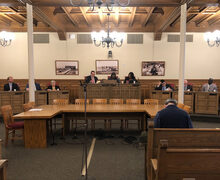Don’t ask, do tell
After two years of development, Devon Stewart’s plan to implement a medical amnesty policy at Syracuse University could become a reality this semester.
Stewart, a senior film major, first brought up the idea of starting a medical amnesty program at SU in 2008 to then-Student Association President Marlene Goldenberg.
But it was not until the policy hit the desk of SA’s then-Chief of Staff Neal Casey last spring that the ball got rolling on Stewart’s plan.
After reviewing the details, Casey, now the chairman of SA’s Student Life Committee, said he found the policy appealing for SU. After repeated holdups last year, Casey said he is determined to push the policy through this semester. No specific date during the semester has been set, but Casey said he would like to see it passed by the end of February.
‘It’s something we were lacking,’ Casey said. ‘This is something that we need.’
The medical amnesty program would allow students under the influence of alcohol or illegal drugs to receive medical attention if anything serious were to occur with no questions asked or immediate legal action taken.
‘The pro is that we are valuing life over judicial sanction,’ Casey said. ‘No one should be fearful to call for help.’
The plan would allow amnesty to the entire SU campus, including dormitory rooms, greek houses and off-campus houses, as well as outline judicial steps that would eventually occur. Stewart hopes to see the policy cover substances beyond alcohol, whether legal or illegal.
If implemented, SU would become the 92nd university nationwide to have an official medical amnesty policy on campus.
‘If we can get this to be adopted, we’ll see students who learn more about themselves,’ Stewart said. ‘There will be more trust with students and the administration. It’s not another parent who is looking to punish you, but someone who is looking out for your best interest.’
Casey said he hopes students would have to go through counseling sessions in order to evaluate the situation further, but each consequence would be on a case-to-case basis.
‘The biggest change we would like to see is the education aspect,’ Stewart said. ‘We want to make services available to students to understand their bodies and what happened.’
Stewart became interested in the policy after being charged with lewd content, public intoxication and disorderly conduct in a drinking-related incident, he said. When Stewart’s friends thought he was in serious danger, they called the Department of Public Safety, which Stewart said responded to the incident by questioning the students instead of making sure he was OK.
After looking through SU’s Student Handbook, Stewart said he found contradictory statements regarding the university’s drinking policy. It first states that students involved in illegal drug or alcohol use will first be put on disciplinary probation, and for a second offense be suspended for a full academic year.
But in a subsequent section, the handbook states, ‘In cases of intoxication and/or alcohol poisoning, the primary concern is the health and safety of individuals involved … Students who seek assistance and medical treatment … will not be subject to disciplinary action provided the only reason any University official is aware of the problem is because the student sought help.’
In response, Stewart formed the Syracuse chapter of Students for a Sensible Drug Policy to work toward forming a medical amnesty policy for students. SSDP is now working with the Student Life Committee in SA to make sure the health and safety of students is put above university repercussions.
After founding SSDP, Stewart found a study conducted by Cornell University in 2002 regarding its medical amnesty protocol. Stewart said he wanted to base a medical amnesty program for SU on Cornell’s policy because it had statistically proven to be successful in a study.
According to the study, once Cornell’s medical amnesty policy was implemented, ‘the percentage of students seen by health center staff for a brief psycho-educational intervention after an alcohol-related emergency more than doubled (from 22 percent to 52 percent) by the end of the second year.’
Once the proposal is drafted, Casey will send the plan to SA President Jon Barnhart to try and get it passed and implemented.
‘We have had very positive feedback,’ Barnhart said. ‘I think it is something completely essential to this campus.
The plan would weed out the potential for immediate punishment, Barnhart said.
If SA were to pass the resolution, the policy would then have to be approved by DPS and Syracuse University Ambulance, and it would ultimately end up at the desk of Gerald M. Martin, director of the Office of Judicial Affairs. Barnhart said that as of now, SA has had nothing but support from various offices.
Casey said he understands many students will find the policy as a free pass for drinking, but the overall goal is to ensure student safety.
Students seem to be agreeing with Casey’s assessment.
Sam Hake, a sophomore television, radio and film major and a resident adviser in Lawrinson Hall, said students are going to drink regardless of rules. While she has to enforce the drinking laws as an RA, she said she is most concerned for student safety.
‘At least now, if students go overboard, they will do the right thing and go to the hospital,’ Hake said.
Amy Martuana, a sophomore magazine major, said she thinks medical amnesty wouldn’t make students drink more; it would just create a safer environment.
‘Obviously people drink,’ she said. ‘If we can have a way of avoiding accidents, then it is a good thing.’
Published on February 10, 2010 at 12:00 pm





